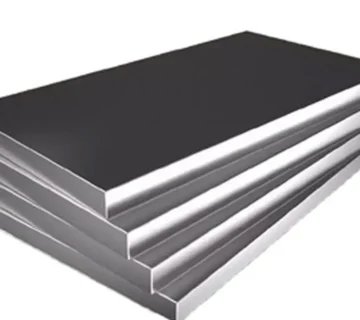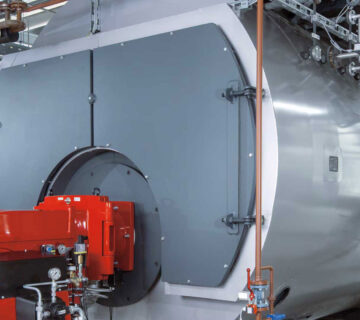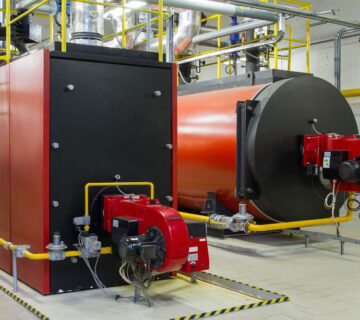Introduction
A steam boiler is one of the key equipment used in various industries to generate steam. The steam produced by the boiler has a wide range of applications in industries such as food processing, petrochemicals, refineries, and power plants. Given the critical importance of boilers, one of the main questions customers often ask is about their price. In this article, we will examine the factors influencing boiler prices and ways to optimize costs.
1. Factors Affecting Boiler Prices
Several factors determine the price of a steam boiler, with the most important being:
- Boiler Capacity: The steam production capacity is a major factor in price determination. Boilers with higher capacities are more expensive due to the increased need for raw materials and more complex designs.
- Material Quality: Boilers are made from various materials such as carbon steel, stainless steel, and alloy steel. Boilers made from higher quality materials are more expensive because they offer a longer lifespan and greater resistance.
- Working Pressure: The operating pressure of the boiler directly impacts its price. Boilers designed for higher pressures require more resistant materials and complex designs, increasing the cost.
- Production Technology: Advanced technologies, such as high-efficiency burners, smart control systems, and optimized thermal insulation, can also affect the final price of a boiler.
- Brand and Standards: The brand of the manufacturer and the standards followed in producing the boiler (such as CE in Europe, DIN in Germany, and the National Iranian Standard) also influence the price. Reputable brands that adhere to international standards usually charge higher prices.
2. Types of Boilers and Their Impact on Price
- Hot Water Boilers: These are primarily used for producing hot water or saturated steam and are generally priced lower than industrial steam boilers.
- Thermal Oil Boilers: These boilers use hot oil for heat transfer and are more expensive due to their advanced technology and higher safety features.
- Industrial Steam Boilers: Designed for high-volume steam production and high-pressure applications, these boilers are commonly used in power plants and heavy industries. Due to their complex structure and the use of high-quality materials, they are priced higher.
3. Importance of Boiler Efficiency in Price Determination
One of the key factors to consider when purchasing a boiler is its energy efficiency. High-efficiency boilers waste less heat and save on fuel costs. Although boilers with higher efficiency initially cost more, they are more economical in the long run due to lower operational costs.
4. Maintenance and Repair Costs of Boilers
Regular maintenance and periodic repairs are also factors that impact the overall cost. High-quality boilers require fewer repairs and have a longer useful life. However, some brands offer strong after-sales services that can reduce maintenance costs.
5. Impact of Advanced Technologies on Price
With technological advancements, modern boilers are equipped with advanced systems like low-consumption burners, automatic pressure and temperature control, and energy recovery systems. While these technologies improve boiler efficiency, they also increase the final price.
6. Environmental Impact and Regulations
In recent years, many countries have enacted stricter regulations regarding greenhouse gas emissions. Boilers that are designed to reduce emissions and improve energy efficiency usually come with a higher price tag. Considering these factors can improve your Google ranking and attract more environmentally conscious customers.
7. Comparing Boiler Prices Across Brands
Various brands offer different features and prices in the boiler market. Choosing a reputable brand with a long-standing history in boiler manufacturing can ensure quality and performance. Companies like Niroo Bokhar Araz, which adhere to international standards and provide after-sales services, are among the top brands in this field.
8. Ways to Reduce Boiler Purchase Costs
To reduce boiler purchase costs, consider the following strategies:
- Buy Boilers with the Right Capacity: Choosing a boiler with the capacity that matches your business needs can help avoid unnecessary costs.
- Use Financing Options: Some boiler manufacturers offer financing options or loans, which can help reduce the upfront costs.
- Compare Brand Prices: Comparing the prices and features of boilers from different brands can help you select the best option according to your budget.

9. FAQs
1. What factors influence the price of a boiler?
Various factors such as capacity, material quality, operating pressure, production technology, and the manufacturer’s brand affect boiler prices.
2. Are high-efficiency boilers worth buying?
Yes, high-efficiency boilers waste less heat and save fuel costs, making them more economical in the long run.
3. How much does boiler maintenance cost?
The cost of maintaining and repairing boilers depends on their quality and the manufacturer’s brand. High-quality boilers generally have lower maintenance costs.
4. What technologies increase the price of a boiler?
Advanced technologies such as low-consumption burners, automatic control systems, and energy recovery systems increase the price of boilers.
5. How much can a boiler reduce environmental pollution?
Boilers with greener technology and higher efficiency help reduce greenhouse gas emissions and are more environmentally friendly.
Conclusion
When selecting and purchasing a steam boiler, factors such as capacity, material quality, advanced technologies, and production standards are critical. To achieve the best results and lower long-term costs, it is advisable to invest in high-efficiency boilers from reputable brands. Niroo Bokhar Araz, with its international standards and high-quality products, is one of the best options for purchasing boilers.




